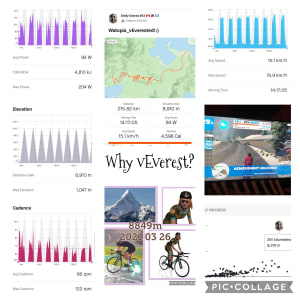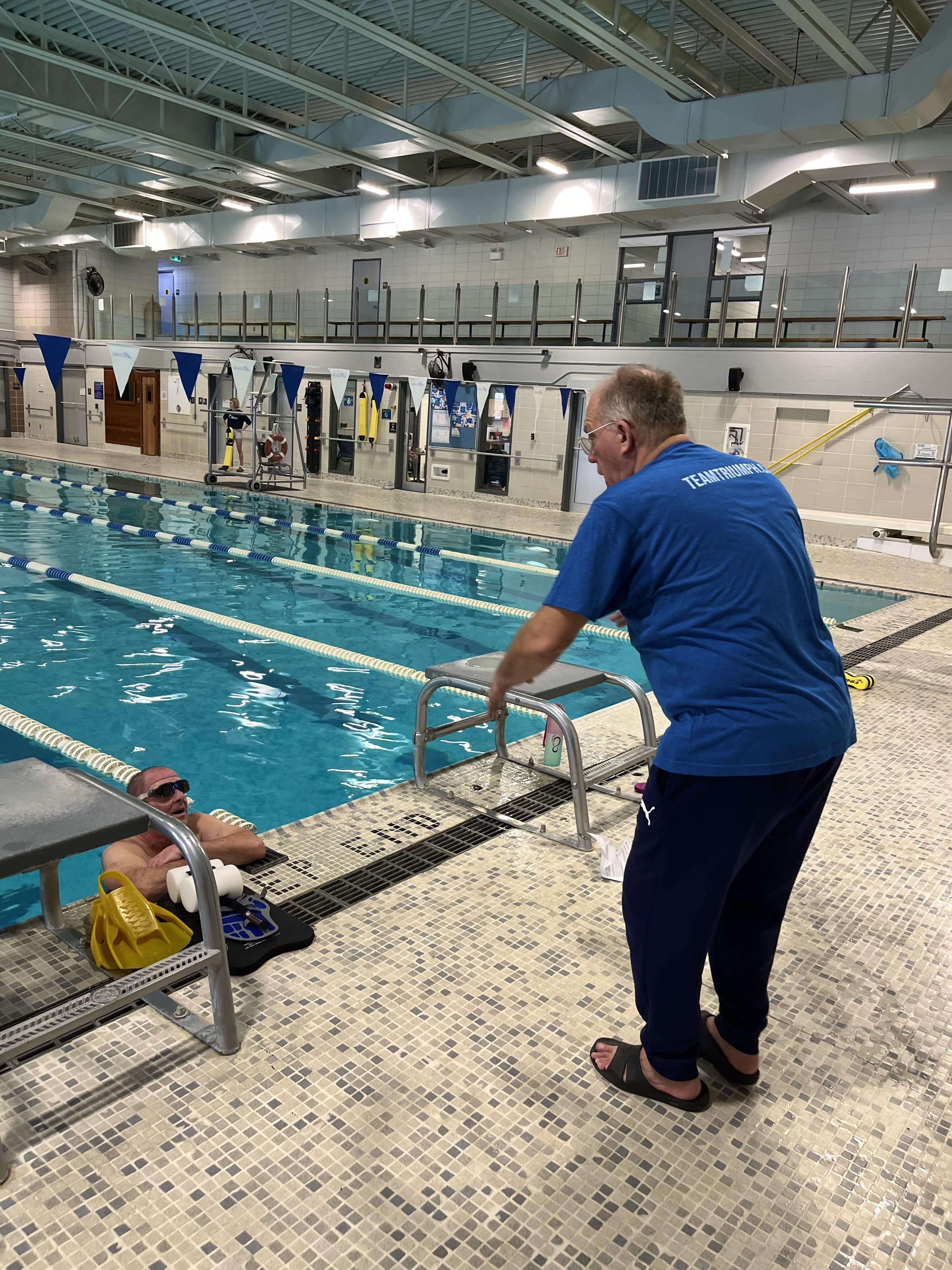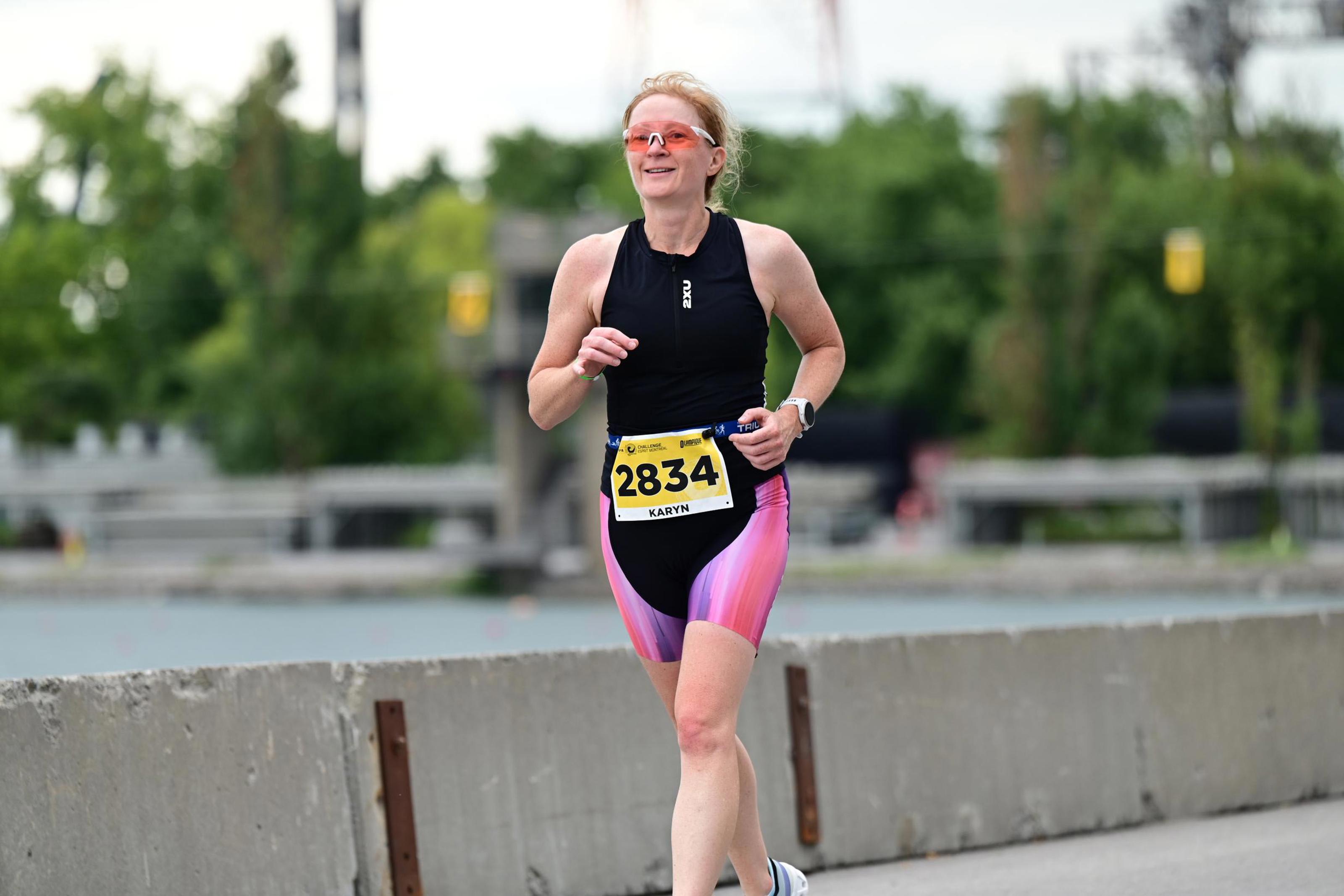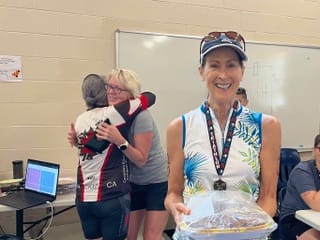
Why vEverest?
It started with the Zwift concept (“Tron”) bike, those virtual multi/neon coloured bikes that whizzed by me as I tackled my preferred virtual routes of under 100 meters high. I did not understand how those cyclists could go that fast while I was still trying to figure out why it seemed so much harder to bike indoors with a smart trainer. As I was sweating buckets with nary a twenty-minute ride on a low elevation route, I said to myself, it has to be the Tron bike. To my chagrin, I discovered that to get the bike, you need to have climbed a cumulative 50,000 metres in elevation. At the rate I was going, at 49 metres high, four times a week, I calculated I would have needed two years to get the bike. Not cool. A new friend from Toronto then told me, well you just need to climb bigger hills, I can set up a Zwift meet up and I will ‘tow’ you to the Road to Sky, that’ll be around 1,000 metres high, then I can set up other group rides that will allow us to do some climbing while helping each other as we will be in group-together mode. Further, he told me that if I did vEveresting, I would get my bike in no time. He had planned to do so in January 2021, and while at first I reluctantly agreed, I did some thinking and thought that would not be a smart idea, given I’m relatively new to cycling and have no real base to boot. But my goal was starting to shift from just acquiring the bike to something more real and meaningful. Besides, due to covid-19, my marathon to Antarctica in March 2021 was postponed with no word on when it might take place, if at all. My mind started to conjure up a date. Incidentally, for winter 2021, to use up some of my vacation leave credits at work, I had booked all Fridays off until April 9 (supposedly to be dedicated to downhill and cross-country skiing). My eyes darted back and forth onto my calendar, and I landed on a date: March 26, a Friday, that’s when I will climb Mount Everest. I firmed up the commitment to myself.
How did I make it work for me?
I had never really delved into the science of things when it came to anything athletic. I never grew up doing athletic things. I only started running in 2014, and road biking in 2018. In my mind, I am just a regular girl who managed to run marathons without any formal training except following an online guide from Hal Higdon. To this day, I do not know the difference between a fartlek and a tempo run. I just ran with joy and abandon, and completed many running races including five marathons to date (my goal in running would have been to run a marathon in each continent, Antarctica, Myanmar-Bagan temples, I had made up a list of all seven already). But in terms of cycling, and to virtually climb Mount Everest, I realized that this time, I needed to look into the science of things. I underwent a vo2 max testing where my “engine” was measured, my lactic acid production assessed, and my calorie burn rate determined: the engine/potential was there however I needed to build my aerobic base, I create lactic acid too fast, and I burn calories fast even on low-intensity activities. Armed with new information about myself, I secured clearance from my medical doctor and sought professional advice from a nutritionist, and a training coach.
What challenges did I overcome?
I had more challenges during the training/lead-up to Everest than during the actual climb. From batteries dying on my iPhone while on a ride and couldn’t plug it into a power source because the phone was projecting to my tv screen, Bluetooth connection issues that rendered my avatar immobile leading to my smart trainer completely non-responsive, my bike not calibrating to the desired 37kph even as I pedalled like a madwoman, discomfort from experimenting on various grain products and other types of food, toe cramps, saddle pressure and saddle sores, my saddle lowering itself down making me wonder why I seemed to be pedalling too close to the ground, my wheel chains emitting scary grinding noises while I pedalled at 10 p.m. at night, and receiving a note from my condo neighbour as to how noisy I have suddenly become;-), to name a few.
How would I describe the actual climb?
By the time I climbed Everest, I could say I was ready for it, in mind, body, spirit. My mind has not changed since the time I decided to do it in late November 2020, my body had gone through a metamorphosis from all the nutrition adjustments and bike training, and my spirit was positively at its best. I wrote up a risk management plan, monitored and recorded the power I used, w/kpg, heart rate, RPMs and other useful metrics. I tried to stick to my zone 2, welcomed the zone 1 breaks, kept the heart rate below threshold, and found comfort pedalling while emitting between 2.3-2.5 w/kpg; when it hit 3.0w/kpg or above, I dialled it down. My strategy was simple: take it climb per climb (8.5 times), and turn-per-turn (21 turns per climb), watch my metrics onscreen very closely (hence I did not turn on my tablet for movies), sip electrolytes at each 0.1 of a kilometre, water at each 0.7 of a kilometre; take small bites of food at 20, 40, 60 minutes (to prepare for the event, I pre-filled up about 60 of those GoodFood ¼ cup containers with quinoa with chicken, oats with nuts, shepherd’s pie, blueberries, applesauce, mashed potatoes, sugar tarts, date squares, rice with salmon and cucumber, etc. and complemented them with bananas, avocadoes, a bag of bad and salty corn chips, a super-sweet sugar drink with coconut gel, a can of ginger ale, and cold peppermint tea; at any rate, I ate in small quantities, enough to secure about 150 calories and 50g of carbs per hour). At one single point, I recognized the small tell-tale sign of bonking; this is when I grabbed the small bag of bad and salty corn chips and downed it with the sugar drink with coconut gel, and I was back within seconds. I took the obligatory 12-minute breaks in between each climb, as I sent the avatar down on auto-pilot; during those breaks, I used the washroom, changed into fresh kits, refilled my food tray and electrolytes and water, and on two breaks, I added a dog walk (his bladder need not suffer just because I was climbing Everest!), and a quick shower as I got too hot.
The actual effort itself was admittedly not that hard, this is because my coach, Julia Cooper-Aimers, incrementally trained me for it, helped me build my aerobic base to a point where I was cycling ten hours on a Friday, and six hours on a Saturday. It was a real mind-bender for me but it set my perspective on what it takes to cycle for sixteen hours. I was in near-tears as I approached the last three minutes of that sixteen-hour weekend. I told myself that if I projected that I needed seventeen hours to climb Mount Everest, and I’ve practiced on sixteen, I only need to make up for that extra one hour, to make it through, but my mind can now handle it. Unbeknownst to me, as I religiously followed the training program she designed for me, my strength had also significantly improved (she told me I doubled it between the time we started and the time I peaked in my training). I did notice at the last leg of my training when I visited #alpeduzwift / #roadtosky that it seemed easier, such that I asked my coach if I can turn off the ERGmode/setting so I could really feel the terrain. I remember telling myself, this is weird, it seems so much more fluid, maybe the non-ERG mode is not working properly as well! So one fortuitous day, my workout somehow ended prematurely (perhaps a glitch in the system), I gleefully sneaked up the Alpe to really test how I felt without any workout settings at all. I was pleasantly surprised at my discovery that, compared to how I hyperventilated when I climbed this mountain before I trained, I was a lot more in control. With that discovery, I solidified my confidence. I reminded myself that as long as I kept things within my metrics, fueled, hydrated, and kept my will and determination steady and strong, I could repeat this climb 8.5 times. And I did and completed it in fourteen hours, vs. my seventeen-hour (or more) projection, and I felt strong even as I hit the finish line.
Would I do it again?
There is a saying that claims, never say never, but I will need another motivator to do this again. I already received my Zwift concept bike two weeks before I Everested. There is also a “hall of fame” for those who complete the challenge; my name is currently there for the basecamp/1/2 Everest that I completed on January 30, and the full Everest climb on March 26, but this is really not a big motivator for me. I might order the Everesting jersey that is offered only to finishers, to match one of my yellow cycling socks because I like things matchy-matchy;). But my biggest motivator was simply achieving something for myself that I never even envisioned or considered, as of five months ago, that I could, or would do. This tells me that my next adventure will also leap on to me in an unexpected way, and I will end up latching on to it, because it will beckon me. And then there’ll be another story to weave and share.

I would highly recommended Eric and Team Triumph!
Ian Ross

A year ago I could only tread water and had not run since childhood. With the amazing Virtual Olympic course, support, guidance, and tips from of all the folks at Team Triumph I've ended the season with my first Olympic distance triathlon under my belt and am hooked! Really looking forward to the 2025 season and even to the hard work over the winter to prepare. Karen Houle

I wanted to let you know that the Perth triathlon was a great experience, I somehow placed third in my age group! What a supportive group of participants (including Team Triumph athletes), cheering bystanders and volunteers.
Thanks to your swim lessons, I learned the technical basics and gained confidence to get back in the pool after decades. And it was really special doing this with Ann Laidlaw, my bestie for many years. We did a couple of additional swims with Kevin and Team Triumph people, also a great way to continue learning and practicing good technical form.
I will continue with lane swimming and who knows, maybe there's another triathlon in my future!